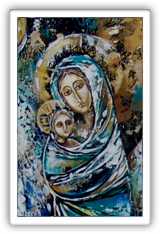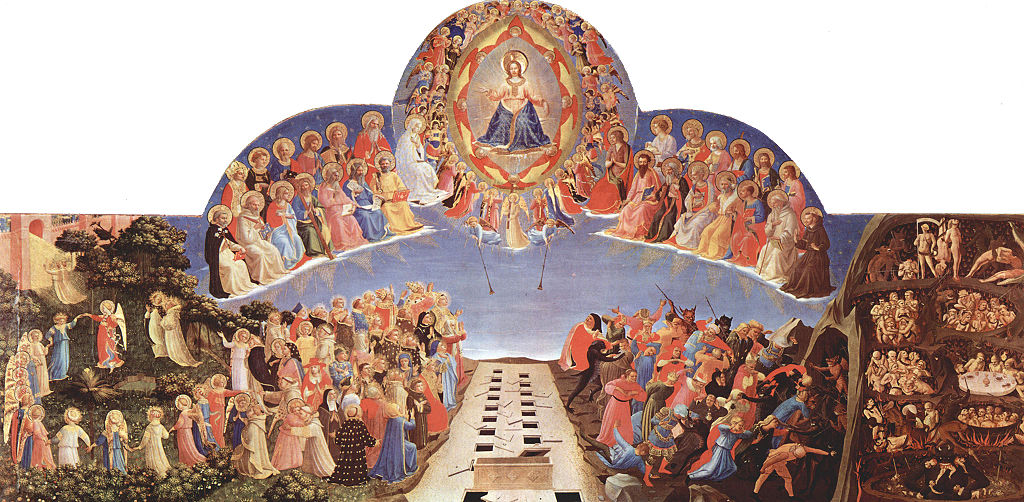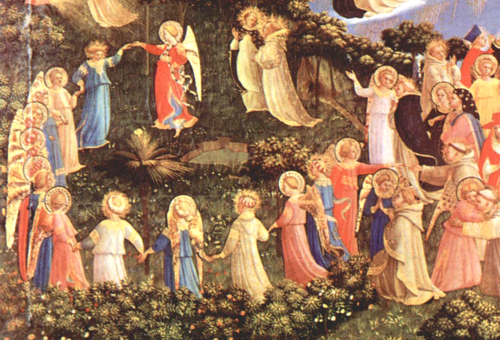|
|
Comprehending Medjugorje : Original Documents And Conversations with Arnaud Dumouch
The vision of Purgatory, Hell, and Heaven
Reference (French Edition) :
Daria Klanac, Comprendre Medjugorje : Regard historique et théologique, avec la collaboration du théologien Arnaud Dumouch, Informativni centar Mir, Medjugorje, en coédition avec les Éditions Sakramento, Paris, 2012, 2e éd. (1re éd. 2008, ISBN 978-2-915380-19-4 & 978-9958-36017-6), entretien avec le théologien Arnaud Dumouch, pages 177 à 183.
English Translation by Duško Čondić
The vision of Purgatory, Hell, and Heaven
Daria Klanac : Several of the visionaries give witness to the fact that the Virgin led them to see Heaven, purgatory, and hell. They vividly describe what they saw. In Heaven there is light, happiness, adoration, and joy.
Arnaud Dumouch : That which, first of all, characterizes Heaven is a face to face vision of God which we can, without any sort of problem, characterize as being “Light.” His other characteristics are found in His effects, (perfect bliss, adoration, and joy). It must be said that without seeing God face to face, a sight that is repeated ceaselessly, such that is anticipates every desire of the soul; Heaven with the rest of its joys would become a “vacant” place.
D. Klanac : Purgatory is seen to be a place filled by fog wherein souls suffer and sigh, conscious that God exists. They are in need of our prayers since they cannot pray for themselves so as to gain Heaven.
A. Dumouch : That which appears in bold faced letters above is true and has been confirmed by Tradition (Saint Catherine of Genoa, Treatise on Purgatory). The reason for this inability on the part of souls at various levels of mystical purification to pray for themselves and to advance on their own lies in the fact that they have attained something that surpasses the strength of every creature to attain on his own, namely, a full state of kenosis (a complete state of pure humility).
This serves to clarify the Old Testament’s statement: “A sacrifice that pleases God is a broken spirit and a humble heart.” This is to say, if one is to see God, one must die to oneself inasmuch as the Triune life is a perpetual state of separation from oneself, the Person turned towards and in the Second Person.
Even though the souls in purgatory do love God with all their hearts and are certain that they will see His face, nonetheless, (one can do nothing about it), such kenosis is unachievable. To have fully submissive heart and to be dead to oneself can only be achieved in Christ’s manner through His experience of despair: “My God, my God, why have you forsaken me?” (Mt 15:34). If Jesus Himself had to experience this from that which He suffered,[49] then, how much more must souls in purgatory that are not yet purified as is the human soul of Christ. The souls in purgatory cannot do anything for themselves since we cannot incite despair in ourselves. Despair befalls a person, and no one seeks it. It is precisely such despair that converts the human heart in one that is a submissive heart.
D. Klanac : Hell is a place of fire and flame.
A. Dumouch : Those flames are, above all else, a metaphor for the interior suffering that is the result of a free-willed renunciation of God by a soul whose nature was created to see God. Such souls secrete themselves in the darkest places of the Universe never to see the glory of the Saints which induces grave anger and suffering in them. The most ordinary mention of such Heavenly souls, their humility attached to their complete happiness, calls to mind in such souls their very own misfortune—a misfortune that they continue to deny inasmuch as they chose Hell for sake of their “freedom.”
D. Klanac : Persons assume the shape of animals.
A. Dumouch : From the very start of Revelation, Heaven makes use of the metaphor of animals so as to express spiritual realities. Hence, Lucifer in the seeming nobility of his revolt as a free creature of God is represented as an upright dragon. Satan, who creeps into our psyche so as to accustom us to corporal egoisms, is represented in the Bible as a snake that eats the dust it move in. Animal forms as such serve as metaphors that assume the following meaning: having seen the condemned, we see their souls and thoughts, namely, their anger that is sustained perpetually and freely. An animal metaphor has the appearance of reality.
D. Klanac : The Virgin said to the visionaries that God granted everyone the gift of free-will.
A. Dumouch : Theologically speaking, that is essential: whoever goes to Hell goes there of his own free will. Jesus expressly asserts in his Gospel: (Mt 12: 31): “Therefore I say to you, that every kind of sin and blasphemy shall be forgiven to man; but the blasphemy against the Spirit will not be forgiven. And whoever speaks a word against the Son of Man, it shall be forgiven him, but whoever speaks against the Holy Spirit it will not be forgiven him either in this world or the world to come.”
Saint Thomas Aquinas (IIa—IIae), making use of the method of attribution to the Persons of the Most Blessed Trinity, quite precisely differentiates three forms of blasphemy:
– Attribution of power to the Father. Imprecations or curses against the Father represent a renunciation of God because of one’s weakness. (The seed fell at the edge of the road, in a place that has shallow soil).[50] A mortal sin against the Father consists of, for example, an act of adultery committed by man who fails to control his sexual appetites and who allows himself to be triumphed over. At the moment of death, when Christ appears in all His glory, the passion of that weakness is removed from men who then can no longer sin because of weakness. Should he reject asking for forgiveness, he does so in a fully free manner; however, in such a case, the mortal sin is no longer one of weakness.
– Attribution of Knowledge to the Son. An imprecation or curse against the Son is a rejection of God for lack of sufficient knowledge. (“Father, forgive them, for they know not what they do.”)[51] A mortal sin against the Son of God, for example, in most cases, consists in the intentional act of abortion when the woman convinces herself that a child is not yet present in her womb. At the moment of death, when Jesus returns in all His glory, in the company of the child, that lack of knowledge will then cease to exist, and that woman can no longer sin through a lack of sufficient knowledge. Should she refuse to seek pardon, and to accept her child, she will do so of her own free will.
– Attribution to the Holy Ghost of the illumination of Love (since He proceeds from the Father and the Son). Imprecations or curses against the Holy Ghost are aimed directly at God’s Love and with full knowledge (there is no lack of knowledge) and in full control of one’s intent (not a matter of weakness) and done freely. An example of this is: the Jewish theologians who, upon having seen Lazarus raised from the dead, clearly a miracle of Divine origin for those who understand such things such as they, decided to reject it and to put Jesus and Lazarus to death. If, at the moment of death, a person insistently maintains his choice in favor of his own egotistical freedom and contrary to Christ in His glory, he will have done so in full freedom. Such a person does not change. That is an example of the sin against the Holy Ghost that merits eternal damnation by the very fact of the perfect freedom of will on the part of the sinner who fully considered his act, and freely chose.
D. Klanac : Therefore, everyone has the gift of freedom of choice—even the free choice to go to Hell.
A. Dumouch : In Hell, one chooses that which he sees as being a good (his egotistical sense of freedom) to such an extent that one consciously and freely loses the fullness of Goodness (the vision of God and brotherly love). This is what Saint Faustina who was declared a saint by John Paul II, has to say of freedom that is seen to be perfect at the moment of death:[52]
“I often see souls in agony and succeed in convincing them of Divine mercy. I pray to God that He grant them full grace that always conquers. Divine mercy has touched the soul of a sinner more than once and in a mysterious manner. From the exterior, it would seem that all was lost, but it is not so. A soul, illuminated by the powerful ray of ultimate mercy turns to God with such strength of love that in but a moment it receives from God forgiveness of its sins and is freed from punishment for them. That person does not evidence any exterior sign of repentance or contrition since he no longer reacts to exterior things. O, how ineffable Divine Mercy is!”
“However, the horror of it all! There are also souls who consciously, and of their own free will reject and despise that mercy. In this instance, we are already dealing with the moment of agony. Meanwhile, God in his mercy grants a soul in its inner being such a moment of light. And, if it wishes, a soul can return to God.”
“But, occasionally, there are souls so hard of heart that they consciously choose Hell. By doing so, they not only make all prayer that is directed to God by other souls on their behalf ineffective but the endeavors of God as well.”
D. Klanac : Then, such souls do not wish for us to pray for them?
A. Dumouch : That is true. That would induce even more pain for such souls (thus, the humility and love of the one who prays are rejected by their own choice, in fact, even from the touch of the natural basis of their spirit). They long for only one thing: that the souls (in their eyes, they are worthy of contempt) who chose to bow in adoration before Christ in humility, simply leave them alone. Of their own free will, they find themselves in the individualism of Hell and proclaim their free choice option for Hell.
D. Klanac : What is your theological view of these truths of faith that are so unpopular today?
A. Dumouch : Some seventy years ago, men were not so bold as to speak too easily of these important themes that feed our sense of hope. This was because a particular writing of Thomas Aquinas, written in his youth,[53] was stressed. In that work, Thomas concluded that certain persons were eternally condemned without their having been able to decide of their own free will (as an example: children who die prior to being baptized; pagans who never heard of Christ; sinners who suddenly die because their heart ceased to beat and who failed to have the opportunity to repent).
Meanwhile, from the time of the Second Vatican Council, the Church took issue with that outdated theory by asserting that salvation is offered to every man: “Inasmuch as Christ died for all, and that the end-goal of man is truly singular, that is, Divine, we must hold that the Holy Ghost extends to all, in a manner known only to God, the possibility that they associate themselves with the Mystery of the Resurrection.”[54] Of course, this does not mean that every person will accept such salvation…
That brief sentence that comes from the apparitions in Medjugorje, namely, as to the freedom of choice one has to choose Hell, is a fact that comes so simply and so appropriately from one of the apparitions. This comes at a time when theologians are loathe to speak about Hell, and, as such, serves as a sure sign of the credibility of the apparitions.
D. Klanac : The visionaries Jakov and Vicka both tell that the Gospa came to Jakov’s house, and took the two of them by the hand to see Heaven, purgatory, and Hell. Jakov’s mother, who was in the house at the time, wondered where they disappeared. This lasted some twenty minutes. It seemed as though the visionaries disappeared to the eyes of men. How is one to explain this manifestation?
A. Dumouch : In Fatima, Mary also allowed the children to seen another world. In that case, they only did so in spirit. Their bodies remained on Earth.
In the case of that which occurred in this instance, it might be said (but one would need more particulars), that the children traveled with their bodies. If this is the case, then we are dealing with a repetition of that which occurred in the Acts of the Apostles, (Acts 8:39), “But when they came up out of the water, the Spirit of the Lord took Phillip away, and the eunuch saw him no more, but he went on his way rejoicing.”
But, this seems to be even more mysterious. You said: “In the eyes of men it would seem that they disappeared.” This seems to bring to mind that which Saint Paul experienced on his way to Damascus, and of which he yet had not spoken of ( 2 Cor 12:3): “And I know such a man, whether in the body or out of the body, I know not, God knows, who was caught up into Heaven…”
In any case, in fact, one would have to verify the nature of that manifestation. It is entirely possible for God to do so and is known to have happened in the lives of various saints. Bodily translocations are known and verified (Saint Martin de Porres, for example), or, along with that, the transport of the soul in some form of body gifted with five senses (Blessed Ann-Catherine Emmerich). In some case, only the spirit is transported (in spiritual meditation according to the Will of God).
49. Heb 5:7-8L “And He, though Son He was, learned obedience from the things He had suffered…” [↩]
50. Mt 13:31 ff. [↩]
51. Lk 23: 24 [↩]
52. Saint Maria Faustina Kowalska, Diary of St. Maria Faustina Kowalska: Divine Mercy in My Soul, Marian Press, 2005. [↩]
53. Commentary on the Sentences. [↩]
54. Gaudium et Spes, No. 22.5, the official translation. [↩]


